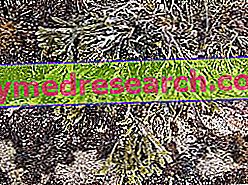
Scientific name
Maxima Spirulina
Spirulina is a blue-green unicellular alga very poor in iodine.
Used Parts
The whole seaweed is used.
Chemical constituents
- Protein;
- Essential amino acids (in particular valine, leucine, threonine);
- Lipids;
- Vitamins (C and
- B and E);
- phycocyanin;
- Carotenoids;
- Mineral salts and trace elements (excluding iodine).
Spirulina in Herbal Medicine: Properties of Spirulina
Spirulina is mainly used as a food supplement thanks to its high content of proteins and essential amino acids.
Biological activity
As mentioned, spirulina is rich in essential proteins and amino acids, but also in omega 3 and omega 6 fatty acids, vitamins and minerals.
Thanks to this particular composition, spirulina is included in the composition of many dietary supplements, which can be used to compensate for certain deficiencies in individuals who adopt particular diets, such as, for example, those who follow a vegan diet.
Furthermore, spirulina supplements can also be used as adjuvants in slimming diets. In fact, if taken before meals, it seems that spirulina is able to anticipate the onset of a sense of satiety.
Spirulina is also quite successful in the sporting field, thanks to its high content of vitamins and mineral salts, but not only. In fact, it seems that the biotin contained in it discourages the production of lactic acid during physical exertion and promotes the elimination of carbon dioxide, while tocopherol, carotenoids and ascorbic acid exert an antioxidant action.
Despite these numerous qualities, spirulina has not been officially approved for any kind of therapeutic application.
However, numerous studies are being conducted on its components to investigate further properties, such as potential immunostimulant, hypocholesterolemic and antitumor activities. In particular, this last property was the subject of a study which showed that phycocyanin present in spirulina may be able to induce apoptosis in malignant cells of human ovarian cancer.
Contraindications
Ascertained hypersensitivity to one or more components.
Side effects
As a rule, spirulina should not cause undesirable effects, even if some nausea and a sense of fullness have been reported in some predisposed subjects.
Furthermore, spirulina may be contaminated with microcystins, or heavy metals. These substances can, respectively, cause gastrointestinal disorders and liver damage.
Pharmacological Interactions
Prolonged intake of alginates can reduce the absorption of iron and other minerals in the intestine.



